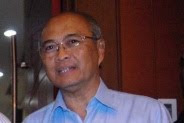
Kuntoro Mangkusubroto
Indonesia will immediately set up an agency similar to the now-defunct Rehabilitation and Reconstruction Agency (BRR) as part of a bilateral agreement with Norway, which provides US$1 billion in grants to help Indonesia reduce deforestation.
"[The agency] should be established before December [this year]," former BRR head Kuntoro Mangkusubroto, now head of the Presidential Working Unit for Development Supervision and Control, said Wednesday evening in Oslo.
Earlier in the day, Indonesia and Norway signed a letter of intent (LOI) to reduce deforestation in Indonesia, where forest areas of a size equaling 300 soccer fields vanish every hour according to Greenpeace.
The LOI includes three major points: Capacity building in which Indonesia needs to set up an agency to monitor the reduction of deforestation; pilot projects in which Indonesia and Norway will choose which forests will receive first priority; and result assessment.
Norway will fully disburse the grant only if the result lives up to expectations. "We pay for the results, it is quite simple,” said Norway's Prime Minister Jens Stoltenberg during the signing.
Kuntoro, the top candidate to lead the new agency, said a BRR-like agency could ensure such programs worked well. "Most important is that the [agency] head's ability to directly report to the President is equal to a minister's, to ensure any decision can be made at the highest level," he said.
The BRR, which oversaw funds to rehabilitate Nias and Aceh post-earthquake in 2004, is considered a solid performing agency in which corruption could be prevented.
"We heard [during the signing] a stressing on the monitoring system. What we need to underline is trust. The person who wants to help must be given the high trust that his aid is used as designated. Such a monitoring system has been introduced to our government system by using GIS-based mapping, in which all physical projects used a coordinate as a basis," explained Kuntoro.
The GIS stands for geographical information system, a system that captures, stores, analyzes, manages and presents data that is linked to locations. It is used in cartography, remote sensing, land surveying, photogrammetry, geography, urban planning, emergency management, navigation and localized search engines.
Kuntoro said the BRR followed the GIS system, which had been adopted by the government since 2004.
He added that Indonesia would learn from Brazil in implementing the system in supervising carbon emissions. Brazil has also received a grant from Norway to reduce emissions.
Kuntoro was confident Indonesia could establish the agency within six months. "I think we need to issue regulations and fund management," he said.


No comments:
Post a Comment